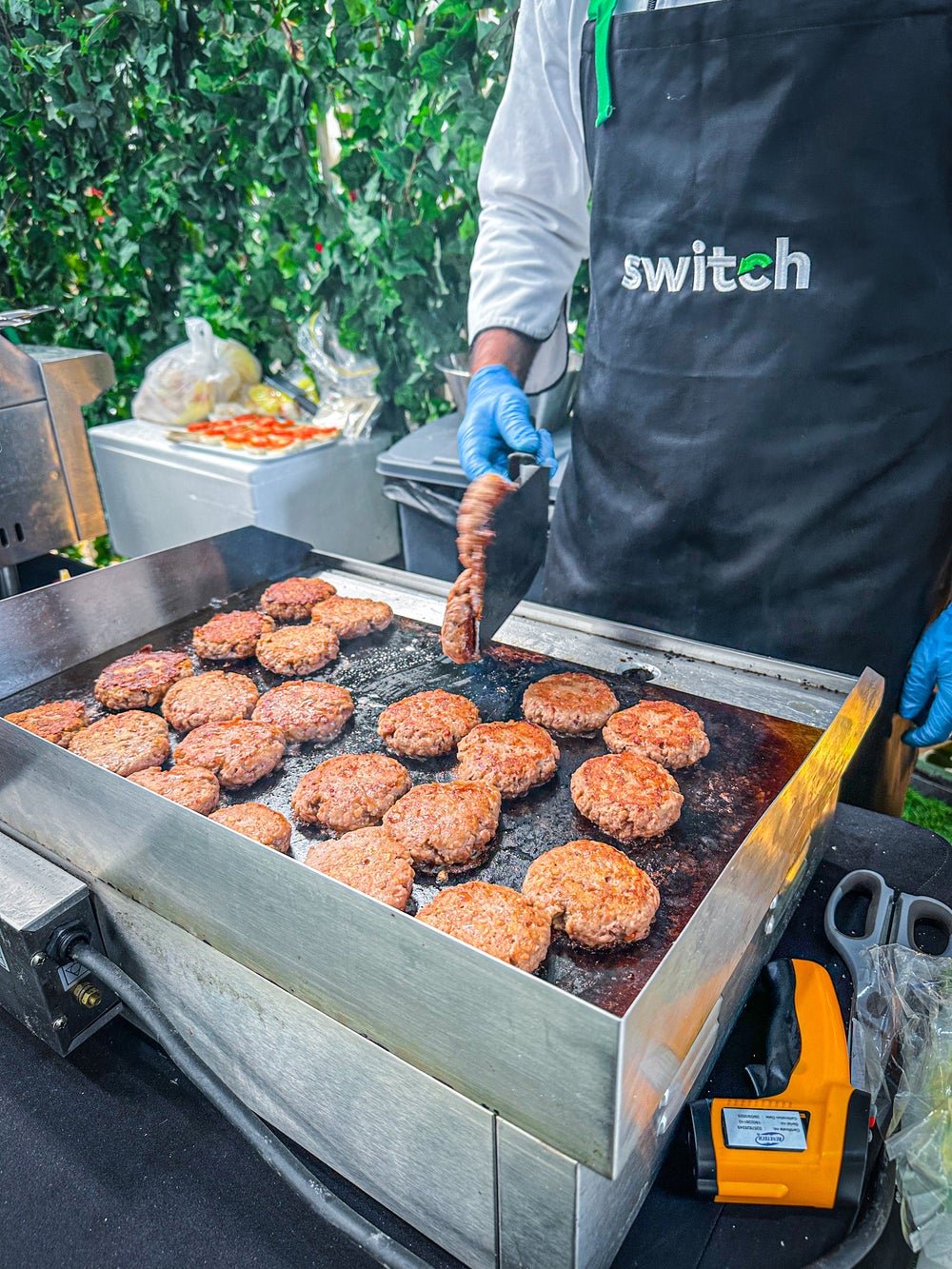Opinions expressed by Entrepreneur contributors are their own.
You’re reading Entrepreneur Middle East, an international franchise of Entrepreneur Media.
As per global data and business intelligence platform Statista, the plant-based meat market is expected to be worth US$33.99 billion by 2027. And while that should be incentive enough for one to start an enterprise in this arena, for Edward Hamod, who founded Switch Foods in the UAE in 2022, one of the drivers for his foodtech startup -which locally produces plant-based alternatives to meat- was his personal experience working in the F&B industry.
“I’ve been working in the food business since 2005, and I have owned, operated, and led many successful food companies across the region,” Hamod reveals. “But in 2017, I started to learn more about the effect of our food systems on the individual’s health, and our planet as a whole. In the years since, I have shifted my mindset from being solely commercially-driven, to focusing more on the purpose of what I do, and how I can use my experience and network within the food industry to build something ‘good.’ I quickly understood the severe effects our food systems have on our health and the environment, and that animal meat production and consumption were a major part of the problem. I also quickly found out that the alternative healthy and sustainable choices to meat on supermarket shelves did not taste good, or provide the consumer with a seamless alternative to animal meat. That’s when the idea came to create Switch Food’s plant-based healthy and sustainable products, which are also delicious and affordable.”
Now, all of Hamod’s observations can be backed by multiple studies that show the adverse effects of food production -meat, in particular- on climate change. A 2023 article published in the MIT Technology Review highlights that cultivated or plant-based meat production can reduce greenhouse gas (GHG) emissions by between 78% and 96%- a stark contrast to how traditional meat production accounts for about 15% of overall GHG emissions.
“We live in a world where health, sustainability, and global climate change are on every government agenda, and on the minds of most people, where immediate drastic measures are needed,” Hamod adds. “One of the top causes of health risks, pollution, deforestation, and greenhouse gas emissions is our food systems. The energy industry is spending billions of dollars to cut emissions and switch to green solutions, and if we do nothing as food producers and consumers, our food systems will soon become the biggest emitters in the world. Plant-based alternatives and increasing consumer adoption of plant- based foods into diets is a must if we are to improve individual health, and slow or reverse our food systems’ impact on climate change.”
Related: Yara Mersi’s Dubai-Based Concept Oatful Has Launched The GCC’s First High-Protein Overnight Oats
 Source: Switch Foods
Source: Switch Foods
Now, while the move towards plant-based meat has been trending in the West, it is also slowly but steadily becoming mainstream in the Middle East as well. In fact, a 2022 report by Mordor Intelligence shows that while the plant-based meat market concentration in the Middle East and Africa can be described as low in comparison to the global market, it is still expected to grow at a healthy compound annual growth rate of 6.44% to reach a value of $412.96 million by 2027.
Within such a growing ecosystem, Hamod adds that his startup’s offerings hold significant value, because the consumer trends are quite unique. “In a region dominated by high meat consumption -three times the average recommended by the United Nations’ Food and Agriculture Organization- the plant-based meat category remains very small, when compared to other markets such as the US, UK, and Europe,” he says. “This niche category has witnessed a slow growth over the past few years with a below-average global scale, due to high-priced generic imports (burgers, sausages, and nuggets). Switch Foods thus aspires to lead and grow the category across the region to reach global levels by offering products that are familiar in the region, are part of everyday dishes, and adhere to the region tastes and culinary habits. Switch thus offers a variety of unique goods suited to local consumers’ interests. Because they are manufactured locally, their prices are competitive with those of meat products, such as burgers, minced beef, kabab, and kafta. This alters the overall landscape of the food category.”
Such a localized approach has landed Switch Foods plenty of successes so far. April 2023 saw the enterprise launch a 2,000 sq. m. plant-based meat production center in Abu Dhabi, and it has since allowed for the the brand’s offerings to make it to the shelves of various UAE-based retail outlets such as Carrefour, Organic Food Café, Geant, Union Coop, Sharjah Coop, and Spinneys, as well as online platforms like Talabat, Kibsons, Careem, and Noon. Earlier this year, Switch Foods also announced a partnership with UAE-based real estate firm The First Group, which will see the former’s sustainable plant-based options be served across the latter’s F&B portfolio of 35 UAE-based restaurants, which includes MasterChef, the TV Experience, Risen, Soluna Beach, The Blacksmith Bar & Eatery, Village Bistro, The First Collection at Jumeirah Village Circle, and Millennium Place Marina. “We only launched 10 months ago, and we are already in the process of entering neighboring markets,” Hamod adds. “Having received great consumer reviews on the quality and taste of our products, we have found positive responses from the industry, as leading large regional restaurant chains show interest in partnering with us. In order to maintain our products’ locality, sustainability, and affordability, we also plan to build production facilities in each of the major markets we enter.”
With such plans in the offing, Switch Foods is thus only getting started with its growth story- and it seems safe to say that the enterprise’s future looks bright.
Eureka! Edward Hamod on how to make an idea a great one
Truly understand the problem that you would like to solve “Most of these problems come up in our daily lives or through daily experiences which we don’t really focus on, whether at work, at home, during travel, etc. Once the problem or the issue is identified, an individual should never be content with the status quo of the current problem, and they should never assume that people have already looked into it and we’re at the maximum line. Today’s advances in technology offer new solutions to problems on a daily basis.”
Don’t believe that a brilliant idea will strike after an hour -or even a day- of thought “Great ideas take time to develop, articulate, and process. An idea starts as a thought, and one should give their thought enough time and focus and continue to deeply explore it, until it really becomes an implementable idea. This might take days, weeks, or months, and it is important to be patient, and do the necessary research, first and foremost.”
To read the full article, Click Here




